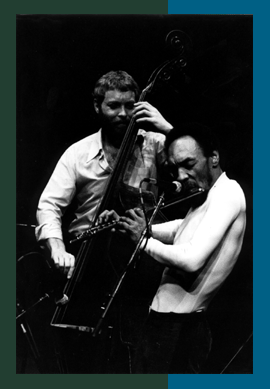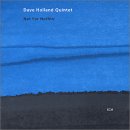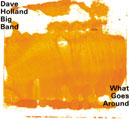

Courtesy of Dave Holland

ECM

A FIRESIDE
CHAT WITH DAVE HOLLAND
(August
21, 2002)
I first
saw Dave Holland with Joe Henderson. I was familiar with Holland from
his killing records with Sam Rivers (on Paul Bley's label) and Circle
(ECM reissue). Then a buddy of mine who owned a used CD store turned me
onto Holland's Conference of the Birds, which features both Rivers and
Anthony Braxton. I was hooked. I've since seen Holland a dozen times,
mostly with his quintet. He's had his quintet for years and initially,
it took on some different lineups that included heavies Julian Priester
and Kenny Wheeler, Steve Coleman, Smitty, Steve Wilson, Steve Nelson,
Chris Potter, Billy Kilson, and Robin Eubanks. But it wasn't until his
Prime Directives record that Holland started turning mainstream media
heads. Usually the last ones on the deal team, the mainstream media has
given Holland numerous accolades, yet the bassist remains humble, and
even more impressive, driven. With a big band record hitting store shelves,
Holland was kind enough to sit down with the Roadshow and talk about his
quintet and the recent and much deserved success he has found as jazz's
favorite son. As always, I bring it, unedited and in his own words.
FRED JUNG: Billy Kilson (drums), Robin Eubanks (trombone), Steve Nelson
(vibes), and Chris Potter (saxophones) have been in your circle for some
time now.
DAVE
HOLLAND: Yeah, this particular group has been together five years, which
is a great run and it's still going to (laughing), which I am glad to
say. So we're very happy about that. It's a couple of things, Fred. A
lot of it is the commitment of the musicians involved and everybody's
got a feeling that this is something we want to do and prolong it for
as long as we can.
FJ: Certainly, each individual musician has his own cross to bear to continue
this musical aggregation, but as it is your name on the marquee, what
sacrifices have you had to make?
DAVE
HOLLAND: Well, I think financially, obviously, there's other ways to make
in the music business than to have a jazz band. So there is certainly
some financial sacrifices, but there is a lot of personal sacrifices you
make in terms of time, time that you need to put into not just the music
side, but the planning and the general running of what is a small business.
FJ: And how long will the quintet continue with Potter increasing popularity?
DAVE
HOLLAND: I don't really have a sort of cutoff point. I just take it a
day at a time. We're planning work a year and a half ahead at least for
various things and the quintet is the main project that we're doing. The
other thing is the big band project, but the quintet is pretty much the
main focus of what I'm doing right now and so there is a lot of planning
that goes into it.
FJ: Let's touch on the most recent quintet recording, Not for Nothin'
on ECM.
DAVE HOLLAND: Well, the albums always, to me, represent in large part
a chance to document the group at a stage in its playing and so the tunes
were tunes we played for the best part of nine months prior to the recording.
Some we played for the whole nine month period, but throughout the nine
months we introduced new music to the band. Not for Nothin' was really
a chance to go in and catalog and document those ideas. I feel very good
about it. I think it really captures the ongoing development of the group
as reflected in the first two CDs and then this one following. I'm very
pleased with the results of it. And of course, we have the new CD coming
out which is the big band CD, coming out shortly.
FJ: Vanity is human nature, so it would be understandable for you, as
the leader, to compose the music, but rather, your approach has been more
of a mentor than a leader, giving equal time to the other four composers
and their respective work.
DAVE
HOLLAND: It is not something that is particular to me. I think there are
plenty of examples of Miles doing that and Duke Ellington. I think when
you have first rate musicians and first rate composers in the band, it
would only be denying myself the pleasure of being able to play some great
compositions that these musicians write as well. To me, it only enhances
the band. It enhances the music. It broadens it and gives it more scope.
I have plenty of chance to play the music that I am writing and hear it
played in an extremely understanding and sensitive way and I am happy
to have those. That is sort of part of the tradition. A lot of working
bands would feature music written by the members of the group. Those people
are the best equipped to know what music the band can play and what possibilities
are being presented, what potential is there to be explored in a composition.
That is very much what we're about. I am interested in what their take
on it is as well.
FJ: Has Eubanks' tenure in the quintet been the longest?
DAVE
HOLLAND: Robin, yes, Robin joined the quintet that I had in the Eighties.
I've known Robin the longest, certainly, and we've played on quite a few
different things together. I've worked on a couple of his recordings that
he's done and he's been involved in some things of mine. So we've had
a very nice ongoing musical relationship and a personal one too for over
fifteen years now.
FJ: With the quintet closing in on the apex of its popularity, why do
a big band recording?
DAVE
HOLLAND: Well, because it is there. The music was written. It felt good
and it really is an extension of the quintet music in as much as the quintet
is the nucleus of this band and the larger array of colors that are provided
in the instrumentation just give us more opportunities to explore ideas
compositionally. Conceptually, I see the music as being very closely related.
It is not a departure by any means. Everybody as I say is involved in
it and the big band represents just a larger setting really of the music
we're playing as a small group.
FJ: Who is filling the various chairs in the big band?
DAVE HOLLAND: We have Antonio Hart on alto saxophone. Antonio has also
been involved in a number of projects. He has sometimes come into the
quintet to fill a space that somebody may have left by something else
that they needed to do. So he has played with the quintet from time to
time. He was also a featured member of an octet that I toured with last
year. So Antonio Hart is on alto. Mark Gross is also on alto. Then Gary
Smulyan is on baritone. Gary was also involved in the octet project that
I did last year. Trumpets are Duane Eubanks and Alex Sipiaguine on second
trumpet. Trombones are, of course, Robin on trombone and then Josh Roseman
and Andre Hayward.
FJ: Was the octet project the seed for the big band record?
DAVE
HOLLAND: Really no, it actually happened after we did the performance
in Montreal as a big band. That is when this group was first put together,
was in 2000, in the summer of 2000 and I was one of the featured artists
in the festival that year, so I got a chance to present four concerts
in the first week of the festival and one of them was the big band. So
that started then. The octet came about through a British Arts Council
tour that I did, they supported and the proposal that I made was for an
octet. Obviously, the octet did give me a chance to work out some ideas
too, but it actually didn't come before the big band oddly enough.
FJ: The logistics of taking a small ensemble on the road can be a pain
in the ass. To take a big band, those complications multiply exponentially.
Have any problems come about?
DAVE
HOLLAND: To be quite honest with you, Fred, we've only toured a very slight
amount with the band so far and everything has worked very well. I have
a very good team of people that help me to have things go as smoothly
as possible. But there are logistics. There is a lot of things to be taken
care of, a lot of details. You do your best to make it work properly.
You count a lot on the discipline, self-discipline of the musicians in
the band too to make it easier. That is something we're counting on as
well.
FJ: As a composer, what are the subtle differences of writing for a larger
ensemble to that of the quintet?
DAVE
HOLLAND: Well, you know, Fred, the quintet, I started the first quintet
in '82 and it really has been the model for me to work out some ideas
about how to write for instruments and to make the most of the instrumentation
that you're working with and so on. I found that to be an excellent workshop
to be working out ideas. The larger big band, for me, I've enjoyed big
bands all of my life. I've listened to them and played in some and admired
the work of particular arrangers. So I've tried to learn along the way
some of the ways people use a big band and how it can be. What are the
options, so to speak and then try to play them to the musical concepts
that I am working on and the compositions that I write.
FJ: Over the past five years, you've had a rigorous touring and recording
schedule.
DAVE
HOLLAND: I think longer than that (laughing), but it is true. The last
five years.
FJ: Any chance of slowing down or are the lulls merely the calm before
the storm?
DAVE
HOLLAND: The problem at the moment is all the things I am doing are things
that I want to do, my choice projects. The only things that I have done
in this year, in the last two years really are the quintet and a few big
band ideas. This summer I toured with a special project group, but most
of my time is taken up by either preparation or working with the quintet
or big band. I don't want to slow up right now. It is just sort of a time
when I think it is to be enjoyed. I have the opportunity to do some really
nice projects and to have a working band, which has been a goal of mine
for a long time, to have various possibilities to present different musical
settings and so on, which is coming together for me now. It is a time
to enjoy that and to be doing it. Hopefully, there will be a time later
in my life where maybe I will want to pace things a little differently.
It feels like everything I am doing right now is something that I want
to do. It is producing some results that I am happy about.
FJ: And with your popularity has come critical praise.
DAVE
HOLLAND: I think expectations will always weigh on a musician. When you're
a young musician they weigh on you in certain ways and that these ways
might change as you get older, but no, you have something that I think
a musician has to deal with is how not to be pursued by those expectations,
but really just do the work at hand, try to keep a positive perspective
on what you're trying to do. At the same time, it is being happy about
the recognition the band's got and the music's got and the opportunities
that I'm getting right now. I am also still trying to keep it in perspective
and it is still about getting up on stage and trying to play the best
you can, trying to write another good arrangement or another good tune.
Those are humbling experiences (laughing) and so I am happy to be involved
in that and enjoy the challenge. There's a lot of different perspectives
on your career, on your work.
FJ: And the future?
DAVE
HOLLAND: We're touring until the end of the year. We've got a few quintet
dates and I would say the majority of the things we're doing before the
end of the year are going to be big band. Then next year we pick up again
with the quintet. We're touring. We're putting together another CD for
the quintet, which is going to be probably coming from some live recordings
we did at Birdland in New York last November. We're going to listen to
that and decide on some material that can be released from that. So that's
sort of the next project for next year.
FJ: Any regrets?
DAVE
HOLLAND: I don't think that does us any good. I think you've got to take
what's happened as an experience on which to build and to move forward.
No, I don't have any regrets. The decisions that I've made at various
points, important decisions, I think have been the correct ones and I
felt right at the time and looking back with reflection, it seemed the
right thing to do. I don't have any regrets about that at all, no. Even
if you make mistakes, having regrets to me is about not having done what
you thought was the best thing to do at that particular time and acted
on it. You regret if those opportunities are missed. But if you did the
best you could at the time and you're true to your own things that you
believe in.
FJ: It's been a long time coming.
DAVE
HOLLAND: Thanks a lot, Fred.
Fred
Jung is the Editor-In-Chief and is ready for some football. Comments?
Email Him